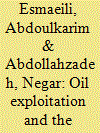| Srl | Item |
| 1 |
ID:
150005


|
|
|
|
|
| Summary/Abstract |
This study investigates the long and short run relationships among carbon emissions, energy consumption and economic growth in India at the aggregated and disaggregated levels during 1971–2014. The autoregressive distributed lag model is employed for the cointegration analyses and the vector error correction model is applied to determine the direction of causality between variables. Results show that a long run cointegration relationship exists and that the environmental Kuznets curve is validated at the aggregated and disaggregated levels. Furthermore, energy (total energy, gas, oil, electricity and coal) consumption has a positive relationship with carbon emissions and a feedback effect exists between economic growth and carbon emissions. Thus, energy-efficient technologies should be used in domestic production to mitigate carbon emissions at the aggregated and disaggregated levels. The present study provides policy makers with new directions in drafting comprehensive policies with lasting impacts on the economy, energy consumption and environment towards sustainable development.
|
|
|
|
|
|
|
|
|
|
|
|
|
|
|
|
| 2 |
ID:
088062


|
|
|
|
|
| Publication |
2009.
|
| Summary/Abstract |
This study refers to a panel estimation of an environmental Kuznets curve (EKC) for oil to determine the factors most affecting oil exploitation in 38 oil-producing countries during 1990-2000. Control variables such as oil reserves, oil price, population, political rights, and the Gini index were used to determine its contribution to the main EKC model. The empirical results fully support the existence of an EKC for oil exploitation. Furthermore, the result indicates that the proved oil reserves has a significant and positive role in oil production, but oil price and population do not significantly affect crude oil production. Also, increased freedoms and a better income distribution will reduce the rate of oil exploitation. Thus, policies aiming at enhancing democratic society and better income distribution would be more compatible with sustainability.
|
|
|
|
|
|
|
|
|
|
|
|
|
|
|
|